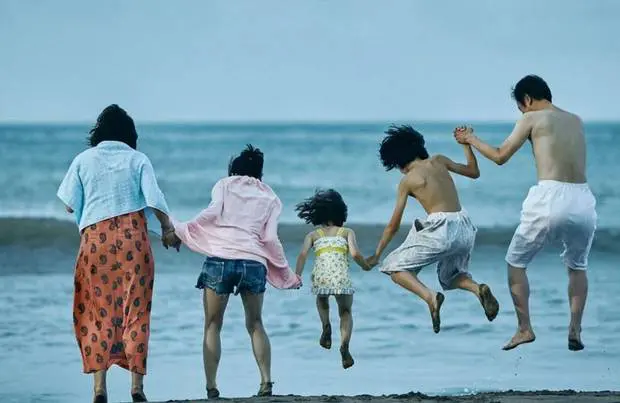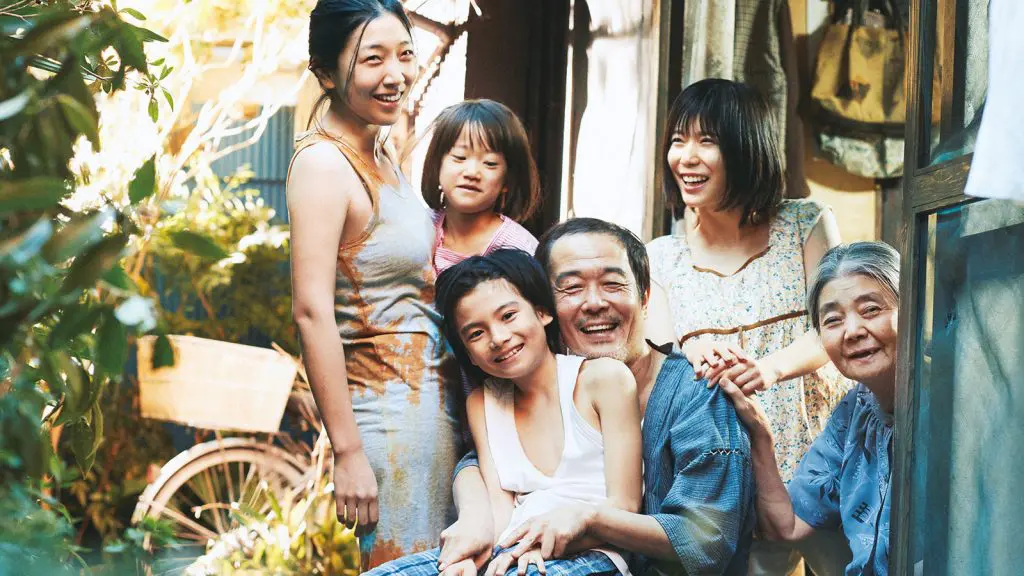Summary
Shoplifters is a poetic masterpiece, which is amusing, tender and very touching. A film which reminds us that the best things in life don’t cost a thing.
Hirokazu Kore-eda’s Nobody Knows is one of my all-time favourite films; on paper, it sounds like one of the world’s most depressing films (five children must fend for themselves after their reckless mother leaves them in a small studio apartment, hardly anyone’s idea of a feel-good film!). However, Nobody Knows is a masterclass of simplicity and genuine tenderness, a film where the characters are authentic and real, and I am glad to tell you that Shoplifters is just as good (if not better). Kore-eda’s latest film, Shoplifters was the winner of this year’s Palme d’Or Donostia award and has gone on to be the fourth highest grossing film in Japan.
There is a maturity and a subtle sophistication to Shoplifters. It is a film which deals with the concept of less is more and where important information is revealed to us with no over-the-top dramatics, but a frank openness, which makes it even more devastating to watch. Like Kore-eda’s previous films such as Nobody Knows, and Like Father Like Son, the theme of poverty and focusing on the underclass of Japan is at the centre of Shoplifters. The film also focuses on what makes a family a family? Is blood thicker than water or has the concept of the family unit evolved so much in the 21st Century that it now has a new form and definition?
The head of the dysfunctional family in Shoplifters is Osamu (played by Lily Frankly from Kore-eda’s Like Father Like Son). Osamu is a bit like Fagin from Oliver Twist, but less sinister and more comedic. It is worth mentioning that behind his big grin, Osamu is harbouring his own secrets and insecurities. This household appears fairly normal and is made up of a middle-aged husband and wife, the wife’s younger sister, a young son and a grandma. It’s a very cramped existence with the five individuals all living together in a cramped apartment, where the grandma lies to her landlord claiming it is only her living at the property. The apartment is so cluttered that it seems like a miserable existence to many of us, but the family seem happy with their living arrangements (and trust me coming from a family of seven people, the home in Shoplifters is all too familiar).

Osamu is work-shy; he seems uninterested in his job as a casual labourer on construction sites, trying his hardest to avoid work and making a big fuss when he has an injury. In order to make ends meet, Osamu actually makes his money selling the things he steals on daily shoplifting expeditions with his boy, Shota (Kairi Jyo). His wife, Noboyu (Sakura Andô), works in a hotel laundry and she, too, steals things left in clothes’ pockets all the time. The younger woman is Aki (Mayu Matsuoka) who brings in her share of the family finances by working as a hostess, stripping in front of clients. Even Grandma Hatsue (who supports this family with her pension) isn’t afraid of playing dirty to get money and guilt-trips the grownup children of her late husband’s second wife into giving her money, gambling most of it away with slot machines. Hatsue is wonderfully played by veteran Japanese character actress Kirin Kiki. It is worth mentioning that this was her last performance; she died in September this year.
One night after a hard day stealing from supermarkets, Osamu and Shota encounter a little girl called Juri (Miyu Sasaki) on a balcony shivering in the cold. Impulsively, Osamu decides to take the young girl home with him. She appears to have marks on her body, she wets the bed and keeps apologising to the point where she might burst out in tears. It is clear to all the adults that this child has been abused. Osamu makes up his mind and declares that they will keep Juri. The family decides to also train her up in the ways of shoplifting, which includes making little hand gestures to your thief-partner to indicate when and what you intend to steal. And this despite the TV news broadcasts about this little girl having gone missing; the family seem reluctant to part with Juri. For Noboyu it is her opportunity to have a “daughter”. The only one that seems less than enthusiastic about Juri staying is Shota, who finds her more of a pain than a new playmate.
The film’s plot could be a thriller or a morbid drama but the film is very much a tender poem to what it means to be a part of a family unit, without being sensational or over-dramatic. Kore-eda manages to capture very human moments with the family interacting with each other; whether it be a clumsy spontaneous act of lovemaking between the parents or the two children shoplifting from a grocery store run by an old man who turns a blind eye to their activities. The final act of the film feels like watching a tower of playing cards come tumbling down, with the family unit falling apart, and we feel helpless and unable to intervene. The honest rawness of the film’s narrative combined with the film’s strong performances makes this one of the delights of 2018. A word of warning, it is quite difficult to contain your emotions, and I suspect that many of us will shed a tear in the film’s closing minutes.




